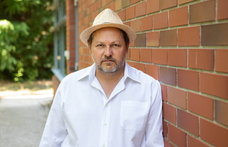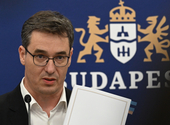"The Presidents speech reflected his moral programme"
The President's Sunday evening speech reflected his moral programme, according to Ferenc Weber, his head of press relations. He was reacting to accusations from several government politicians who said the speech was just "oil on the flames."
"The speech reflected his moral programme," he said, defining the office of president of the republic as "the moral arm of government."
He said Laszlo Solyom's speech had reflected firm moral and constitutional principles. The content of the speech was appropriate to a president, he said.
Weber recalled that in August, Solyom had said in an interview: "If it becomes accepted that a good aim justifies any means, such as ignoring electoral promises, then democracy is threatened by a loss of credibility."
The President had been obliged to speak on Sunday evening because the Ferenc Gyurcsany had defended the proposition that the end justified all means, Weber said. It would be hard for the President to prevent his views from occasionally coinciding with the policies of a given party. This did not mean, however, that the President was supporting that party's policies.
"I found it equally objectionable when it was assumed that the President signed the law on the Gyurcsany package not because of constitutional considerations but because he was somehow defending the government's interests," Weber added. The speech was not disproportionate, because it reflected the importance of the issues concerned.
Weber said Solyom was the first to condemn the violence seen at the demonstrations, the first to say the demonstrations had nothing to do with 1956, and the first who labelled the protesters' unconstitutional demands harmful.
On Sunday evening, the prime minister said it was important to know the President's views, with some of which he agreed, and with others of which he did not.
Katalin Szili, the president of Parliament, said Solyom's speech was unworthy of the presidential office. "At seven o'clock, the president of the republic gave a speech which contained numerous points that I found very interesting. I do not think that the situation in Hungary merits a speech that is unworthy of the office of president," she said in a TV interview.
Gabor Kuncze, president of the Free Democrats, said in a television interview on Monday morning that this was the first time in Hungary that a president had called for a prime minister to resign on the day of an election.
He said Solyom's speech was "pretty odd." The gradual loss in confidence in politics and the moral crisis which had supposedly justified a speech calling for Gyurcsany's dismissal, were, he said, the result of a long process. Part of this process had been the spiral of promises seen in the parliamentary elections, when Fidesz had promised four times more than the Socialists. The manner in which Solyom had taken office had itself done little good to public life, he added.
Gabor Demszky, the mayor of Budapest, said in a television interview, that Solyom's comments were "oil on the flames," and that they should not have been made. He said: "The President should be more neutral than he was yesterday."
The Free Democrat politician said that while it was right to behave circumspectly towards a president, and while it was not common practice to ask presidents to explain their speeches, it would nonetheless be appropriate for him to explain what he had said. This was because the president "is not the Good Lord's earthly prophet."
The president would do well to explain his words, since "by heating up the argument, he created the situation yesterday."


















